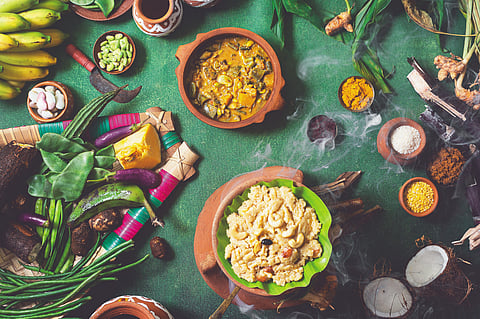
- Destinations
- Experiences
- Stay
- What's new
- Editor’s Picks
- Responsible Tourism
- CampaignsCampaigns
- Subscribe

Pongal, a significant festival in Tamil Nadu, is a celebration that expresses gratitude to Mother Nature and cattle, intertwined with worship for a bountiful harvest. The word “Pongal” means “to boil over” or “overflow,” symbolising the abundance and prosperity associated with the harvest season. Also referred to as “Thai Thirunal,” translating as the commencement of the harvest season is distinguished by the riot of colours, the fragrance of fresh paddy, the sweet scent of sugarcane, and the presence of adorned bulls. This four-day festival holds immense importance among the Tamil people. Though originally the festival was observed as a way to express gratitude and respect towards the Sun God, Surya, for a bountiful harvest, Pongal has with time incorporated many new aspects of festivities and joy.
Pongal is a four-day-long festival that is celebrated with great pomp and fervour. Each day holds its unique significance. The festival begins with Bhogi Pongal, which involves discarding old belongings and cleaning homes. This cleansing process signifies the readiness for a fresh start and symbolises cleansing the mind and spirit alongside the physical space.
The festival’s primary day is Thai Pongal, dedicated to the Sun God. On this day, families wake up early to prepare a special dish called ‘Pongal.’ The dish is made from newly harvested rice, lentils, jaggery, and milk. The ingredients are carefully combined and cooked in earthen pots until they overflow. Cheers of “Pongal o Pongal” resonate as pots brim with abundance, signifying a shared hope for prosperity. Families dress in traditional South Indian attire, decorate their homes with kolams, and offer their deities delectable Pongal dishes to their deities in prayer.
Mattu Pongal honours cattle, particularly cows and bulls, as essential agricultural partners. On this day, these animals are given special attention and adorned with colourful garlands. Their horns are painted in vibrant hues, expressing their significance in farming. Farmers express gratitude to their livestock through special rituals and feasts, acknowledging the indispensable role played by these creatures in their agricultural pursuits.
Kaanum Pongal, the concluding day, is a time for families to come together and enjoy outdoor activities. It involves visits to parks, beaches, and other recreational spaces, emphasising the importance of relaxation and socialising during the festive season. It is a time for sharing joy and laughter and strengthening family bonds.
The widespread Pongal festival in Tamil Nadu offers a rich cultural experience. Pongal celebrations in the State are notable for lively banter and joyful laughing. Popular games as part of the festivities are held across the State. Travellers should witness the exhilarating Jallikattu, a traditional bull-taming sport in places like Alanganallur. This 2,000-year-old game involves releasing a bull into a crowd, and participants try to control it by holding onto its hump to win a prize. Attending such cultural gatherings further enriches the Pongal experience. In Madurai, the Meenakshi Sundaraswarar Temple is adorned with vibrant rituals, while in Chennai, Marina Beach becomes a hub for traditional games. Games such as cattle races, sugar cane breaking, and a competition of the best Pongal kolam (rangoli) using rice flour are seen annually. Vazhukku Maram, a game involving a greased tall pole on which to climb, and Silambam, a traditional Indian martial art that originated in Tamil Nadu, are also observed in flying colours. Thanjavur’s Brihadeeswarar Temple hosts cultural events, providing a glimpse into Tamil Nadu’s rich heritage. Engaging activities include Pongal cooking demonstrations, village fairs, and markets featuring local crafts. Most of these games are safe and witness a wide participation of people irrespective of age and gender.
Pongal is unique to Tamil Nadu, reflecting the State’s agricultural heritage and cultural identity. It highlights the strong connection between the Tamils and the land they cultivate. This festival is not just a religious event but a holistic celebration of rural life, agriculture, and community bonds. Many other festivals such as Makar Sankranti, celebrated at the commencement of the harvest season annually on January 14, Lohri, celebrated a night before Makar Sankranti, and Bihu, exist across India and are celebrated in connection to the harvest season. However, the rituals associated with Pongal are deeply unique to Tamil culture and reinforce the values of hard work, cooperation, and veneration for nature, which resonate with the ethos of the Tamilians.
